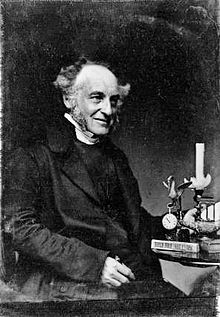- Derwent Coleridge
-
Rev. Derwent Coleridge 
Born Derwent Coleridge
14 September 1800
Keswick, CumberlandDied 28 March 1883
TorquayNationality British Alma mater St. John's College, Cambridge Occupation Educator, scholar and author Children Ernest Hartley Coleridge; Christabel Rose Coleridge Parents Samuel Taylor Coleridge; Sarah Coleridge née Fricker Derwent Coleridge (1800–1883), third child of Samuel Taylor Coleridge, was a distinguished English scholar and author.
Contents
Early life
Derwent Coleridge was born at Keswick, Cumberland, 14 Sept. 1800 (Derwent Water is not far away). He was sent with his brother Hartley to be educated at a small school near Ambleside. The two brothers were in those days in continual intercourse with Southey and Wordsworth. Derwent was sent to St. John's College, Cambridge,[1] where he formed intimate lifelong friendships with W. M. Praed, Macaulay, John Moultrie, Sidney Walker, Charles Austin, and Bulwer. In the autumn of 1822 he joined them as a contributor to Knight's Quarterly Magazine. His contributions, signed ‘DAVENANT CECIL,’ were mostly poetical. He proceeded B.A. 1824, and M.A. 1829.
In 1825 he was ordained by William Carey, Bishop of Exeter; soon afterwards he was appointed master of the grammar school at Helston, Cornwall. One of his most distinguished pupils there was Charles Kingsley. While at Helston he published his largest work, The Scriptural Character of the English Church (1839). He agrees with the conclusions which Mr. Gladstone supported in Church Principles considered in their Results, published the following year, although Mr. Gladstone wrote as a pronounced high churchman, while Coleridge aimed at setting forth the views of his father on church and state. The avowal that he wished to be regarded as his father's disciple induced F. D. Maurice to dedicate to him his Kingdom of Christ. Coleridge's book, though eloquent, missed popularity, perhaps on account of its impartiality.
Chelsea
In 1841 he was appointed first principal of St. Mark's College, Chelsea, just established by the National Society. He held that post until 1864, and undoubtedly did much to shape the course of elementary education in England. He was a strong advocate of Latin in mental training, placing it altogether above mathematics or physical science. The study of languages was always a passion with him. Dean Stanley once declared him the most accomplished linguist in England. He could read Cervantes and Alfieri as easily as Racine and Schiller, and was well acquainted with Hungarian and Welsh poetry; of the latter he was intensely fond. He could also read not only Arabic and Coptic, but Zulu and Hawaiian.
Under his guidance sacred music was made a large part of the training of the college students. Choral services were not known in 1841, except in cathedrals, and when one was established in St. Mark's College Chapel pilgrimages used to be made to hear the novelty, not only from all parts of London, but by country clergy. ‘The chapel service is the keystone of the arch,’ he wrote in an interesting letter to Archdeacon Sinclair, published in 1842. He published several pamphlets in the course of his principalship, all evidently inspired by the desire to place the education of the people in the hands of the church, though his view of the church itself and its doctrines was by no means a narrow one. His last publication on the subject was a manifesto against compulsory education and in favour of denominational schools.
Literary work and later life
His life of his brother Hartley, published in 1849, is a very well-written biography, and he also edited some of his father's works in conjunction with his sister. In 1864 the works of Praed appeared under his editorship, and with a memoir by him. In 1854 Bishop Blomfield offered him the living of Northolt, but he declined it. Ten years later he accepted from Bishop Tait the rectory of Hanwell. Finding the parish church a long way from the population, he set to work to build a new one in the midst of them, and it was consecrated on the last day of 1879, when he was in his eightieth year. His mind had lost none of its vigour when he resigned next year, but he had become subject to constant attacks of acute neuralgia, and he retired to Torquay, where he died on 28 March 1883. His wife, to whom he had been married for more than fifty-five years, survived him. He left a son (Ernest Hartley Coleridge) and a daughter (Christabel Rose Coleridge).
References
- ^ Derwent Coleridge in Venn, J. & J. A., Alumni Cantabrigienses, Cambridge University Press, 10 vols, 1922–1958.
- Attribution
 This article incorporates text from a publication now in the public domain: "Coleridge, Derwent". Dictionary of National Biography. London: Smith, Elder & Co. 1885–1900.
This article incorporates text from a publication now in the public domain: "Coleridge, Derwent". Dictionary of National Biography. London: Smith, Elder & Co. 1885–1900.- Hainton, Raymonde and Godfrey (1996) The Unknown Coleridge: the Life and Times of Derwent Coleridge, 1800-1883 London: Janus
 This article incorporates text from a publication now in the public domain: Chisholm, Hugh, ed (1911). Encyclopædia Britannica (11th ed.). Cambridge University Press.
This article incorporates text from a publication now in the public domain: Chisholm, Hugh, ed (1911). Encyclopædia Britannica (11th ed.). Cambridge University Press.
External links
- Works by or about Derwent Coleridge in libraries (WorldCat catalog)
Categories:- 1800 births
- 1883 deaths
- People from Keswick, Cumbria
- Alumni of St John's College, Cambridge
- Church of England clergy
- English educators
- English writers
Wikimedia Foundation. 2010.
